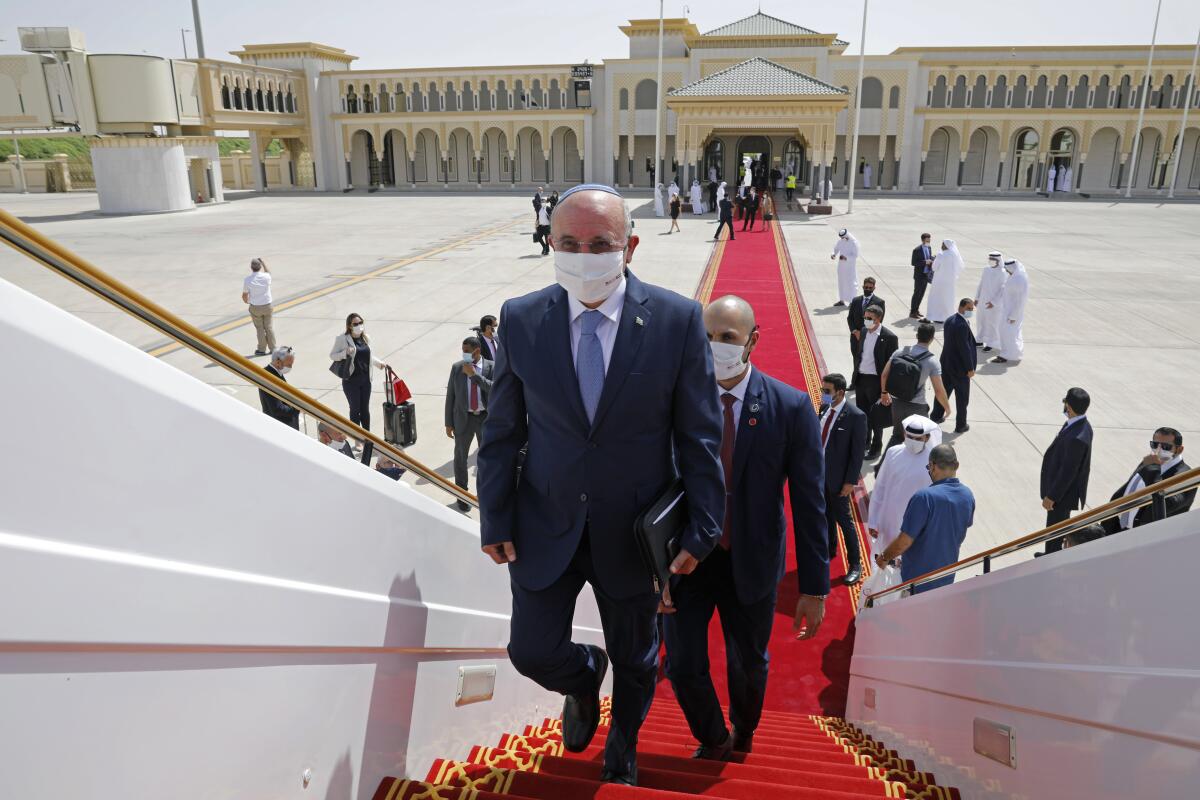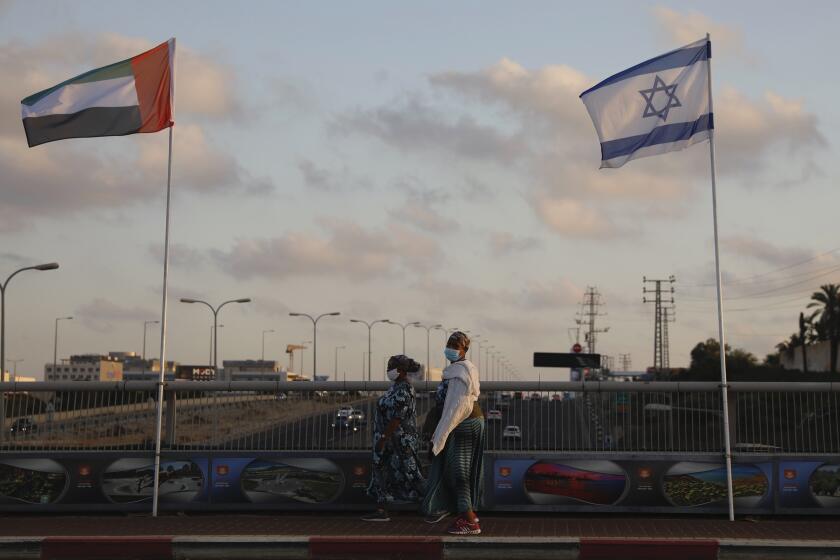As some small gulf states normalize relations with Israel, Palestinians see fraying support

- Share via
BEIRUT — For almost two decades, Arab states pinned the prospects for normalized relations with Israel on a Saudi-led plan that conditioned rapprochement on a deal giving the Palestinians their own state.
But the United Arab Emirates’ move toward establishing full diplomatic relations with Israel last month, and a similar step Friday by Bahrain, reflects a fracture in the ranks — one that leaves the Palestinians behind.
“No matter who does or doesn’t normalize next, the message to Palestinians is clear: You are completely on your own,” said Khaled Elgindy, a senior fellow at the Middle East Institute think tank and a onetime advisor to the Palestinian Authority leadership. “The Palestinians already knew they couldn’t count on the U.S., and now their traditional base of support — the Arab world — is crumbling.”
The impression that most Arab states may be willing to normalize relations with Israel without a two-state solution could be further reinforced in the coming weeks, with the Trump administration pressuring others to follow the United Arab Emirates’ lead in a bid to score what it can label as diplomatic successes ahead of the November U.S. presidential election.
The United Arab Emirates formally ends its boycott of Israel amid a U.S.-brokered deal to normalize relations between the two countries
On Saturday, Israeli media reported that President Trump was pushing Morocco to introduce direct flights to Israel. (There are no formal relations between the two countries, but about 3,000 Jews live in Morocco, and Israelis are allowed to visit.) And on Sunday, Oman’s leadership — which has so far resisted normalization — issued a statement saying it “welcomed” Bahrain’s initiative on relations with Israel, even as it reiterated its support for a two-state solution.
“Oman hopes this new strategic path taken by some Arab countries will contribute to bringing about a peace based on an end to the Israeli occupation of Palestinian lands and on establishing an independent Palestinian state with East Jerusalem as capital,” read the statement.
In some ways, most Arab countries have little to lose in normalizing relations with Israel, said Karen Young, a resident scholar at the American Enterprise Institute.
“They make this concession — if it’s a concession — to the Trump administration, then it’s good for them. But if Biden is elected, who is going to criticize them for it?” Young said in a phone interview Saturday. “So it’s a win-win, and the economic incentives and back-channel talks were there anyway.”
Yet even if it is perceived as a win-win for certain states willing to cut a deal, it’s seen as a lose-lose by the Palestinians, who have condemned the Emirates’ and Bahrain’s actions as a betrayal, with the Palestinian Authority saying the Bahrain deal legitimized “the ugly crimes of the Israeli occupation against the Palestinian people.”
It also remains unclear how much support there is for normalization with Israel among general Arab populations, where sympathy for the Palestinians appears to remain high.
“The regimes only represent themselves. These are oppressive monarchies that have absolute control, whether political or economic,” said Maryam Khawaja, a Bahraini human rights defender based in Copenhagen, in a phone interview Saturday.
Khawaja noted that hours after the announcement of the deal between Bahrain and Israel, #Bahrainis_Against_Normalization became the top-trending hashtag in the country. That happened, she added, despite the dangers Bahrainis face when expressing dissent, including imprisonment and torture.
“People in Bahrain know they’re putting themselves at risk, but this issue has brought together different people, whether Sunnis, Shiites, secularists,” she said.
And even though the Emirates and Bahrain may have gone ahead with the tacit approval of regional heavyweight Saudi Arabia, it is unlikely Riyadh will follow suit, said Michael Stephens, an associate fellow at the Royal United Services Institute.
“Once you walk through that door you don’t really walk back. And for Saudi Arabia there’s a high cost,” Stephens said in a phone interview Sunday. He added that as the main architect behind the Arab Peace Initiative, it would be difficult for Saudi Arabia to begin normalization with no concessions from Israel, especially with the kingdom’s status as a leader of the Muslim world.
“Saudi Arabia simply cannot make peace deals like a little gulf monarchy can. A Saudi monarchy has to think of dynamics that an Emirati or Bahraini prince doesn’t; they’re questions of global politics and not just quid pro quo deals.”
Economic incentives dangled by Israel and the Trump administration are especially important for Bahrain, which had a Jewish community of around 30 people, according to a census in 2011, and has for years made moves indicating it would welcome normalization, including the hosting of a Peace to Prosperity Workshop last year. Economically, said the American Enterprise Institute’s Young, the country is facing a deficit that has ballooned its public debt to 93% of its annual economic output, making it dependent on foreign investment it hopes will be forthcoming after normalizing relations with Israel.
The Emirates had already quietly forged a relationship in recent years, calling upon Israeli technology in medicine, cybersecurity and drone warfare. It also expects Israeli support for its bid to procure F-35 aircraft from the United States.
Thus far, Young added, there has been little fallout over key Palestinian issues. When Trump moved the U.S. Embassy to Jerusalem, for example, protests broke out in some Arab capitals, but the outrage was not sustained.
Trump administration officials have also sought to tamp down religious tensions by saying that Israel would grant worshipers from the Emirates and Bahrain access to religious areas, including the Aqsa mosque, one of the holiest sites in Islam.
“This will reduce tension in the Muslim world and allow people to separate the Palestinian issue from their own national interests and from their own foreign policy, which should be focused on their own domestic priorities,” said White House senior advisor and Trump’s son-in-law Jared Kushner after the Bahrain deal was announced.
Moreover, there has been growing exasperation with the Palestinians, among younger Persian Gulf leaders with little regard for the political leanings of their predecessors. In 2018, for example, Saudi Crown Prince Mohammed bin Salman complained that Palestinians should “shut up and stop complaining” and accept a White House peace plan.
The Palestinians also haven’t been helped, Elgindy said, by their own disunity, with two rival authorities in the West Bank and Gaza Strip.
“People lose faith,” Elgindy said. “Why should I support you, if you’re not even supporting yourselves, by being minimally unified, they ask?”
“Yes, they are dealing with bad faith actors, with those who don’t believe in the two-state solution, but there’s also Palestinian responsibility. The very least you could do is to have your own house in order. Then you can count on or develop a regional strategy.”
Palestinian leaders say the steps taken by the Emirates and Bahrain destroy the Arab Peace Initiative. And regardless of any normalization agreements, said Husam Zomlot, Palestinian ambassador to the United Kingdom, peace between Israel and the Palestinians will require compromise between the two principal parties.
“The key question is does this bring us closer to peace in the Middle East? It’s a capital No,” he said in a phone interview Saturday.
He added that lack of support from gulf states would cause additional pain for the Palestinian leadership, but it was not a “make-or-break issue.”
“Neither the Emirates nor Bahrain have fired a bullet or engaged militarily with Israel,” he said. “The conflict in the end is a Palestinian-Israeli conflict.”
More to Read
Sign up for Essential California
The most important California stories and recommendations in your inbox every morning.
You may occasionally receive promotional content from the Los Angeles Times.











